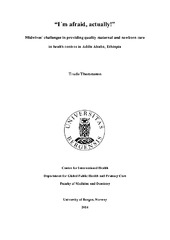| dc.description.abstract | Despite several international commitments including the Millennium Development Goals and national efforts the maternal and neonatal mortality in low- income countries is still high. Still 329,000 women and more than 6 million neonates die every year. Access to antenatal care, skilled attendance at birth and access to emergency obstetric care are important determinants to reduce the numbers of deaths. In this statistic Ethiopia is one of the countries that are suffering most. Midwives play a crucial role in reducing maternal and child morbidity and mortality, and there is an increased focus on the education and deployment of midwives in low-income countries. However, both the pre-service education of midwives and their working conditions are poor, including little opportunities for professional development. Through a qualitative study I aimed to increase the knowledge of midwives´ challenges in providing quality maternal and neonatal care. The study was conducted in three different health centres in Addis Ababa, Ethiopia for three months during fall 2013. The data were collected through participant observation in the delivery ward. In addition I did 11 semi- structured, narrative interviews with the midwives. The concept of evidence- and experience-based knowledge is used in the analysis. Technically I analysed my data using Thematic Content Analysis. Fear of complications in labour and childbirth, a poor working environment with little supervision and role models and lack of motivation for entering into midwifery are the most important findings. The findings are presented through quotes and examples from the maternity ward. My study is presented as a monograph. Based on the findings I conclude that the education of midwives in Ethiopia needs to be revised and improved. A recognized autonomous profession in a sustainable and safe working environment are important conditions for midwives to improve the quality of care. | en_US |
